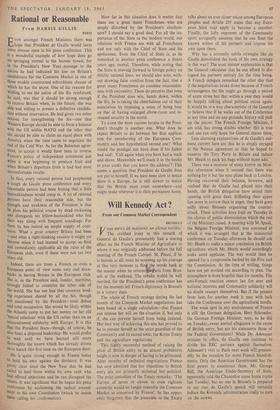Will Kennedy Act ?
From our Common Market Correspondent
BRUSSELS
11 ous auriez du maintenir un silence terrible.'
V The crabbed irony in this remark of General de Gaulle's presumably had a searing effect on the French Minister of Agriculture to whom it was originally addressed before the full meeting of the French Cabinet. M. Pisani, if he is human at all, must be screwing up his courage at this very moment to flinglhe words back at the master when he returnstowParis from Brus- sels at the weekend. The rebuke would be well merited, for the President's press conference has for the moment left French diplomacy in Brussels in a tottery state.
The whole of French strategy during the last month of the Common Market negotiations has been based on a single calculation—that France can impose her will on the situation if, but only if, she can prevent herself from being isolated. Her best way of achieving this aim has proved to be to present herself as the strict guardian of the Community and its sacred texts; the Rome Treaty and the agriculture regulations.
This highly successful method of raising the price of British entry to an almost prohibitive height is now in danger of having to be jettisoned. After months of technical negotiations France has now admitted that her objections to British entry are not primarily technical but political. The strict custodian of the Treaty remarks : 'The Europe of seven or eleven or even eighteen countries would no longer resemble the Common Market as conceived by France'; he has appar- ently forgotten that the preamble to the Treaty talks about an ever closer union among European peoples and Article 237 states that any Euro- pean State may apply to become a member. Finally, the lofty exponent of the Community spirit arrogantly assumes that he can flout the known wishes of his partners and impose his own upon them.
Why has a normally subtle strategist like de Gaulle demolished the basis of his own strategy in this way? The most sinister explanation is that the General calculates that he can afford to dis- regard his partners entirely for the time being. A French delegate remarked the other day that if the negotiations broke down because of French intransigence the Six might go through a period of acute stress but that within a year they would be happily talking about political union again. It would be in a way characteristic of the General to believe that if he walks out of the Conference at any time and on any grounds, history will pick up the pieces. The French Foreign Minister, I am told, has strong doubts whether this is true and one can only hope the General shares them, Less alarming explanations of de Gaulle's out- burst current here are that he is simply enraged at the Nassau agreement or that he hoped to unnerve the Tory Party in Britain and induce Mr. Heath to pack his bags without more ado.
There was a moment of stony horror on Mon- day afternoon when it seemed that there was nothing for it but the next plane back to London. Having recovered their balance, however, and realised that de Gaulle had played into their hands, the British delegation have seized their opening with great dash. Stiffening their upper lips more in sorrow than in anger, they haVe gone sadly about Brussels organising the counter- attack. These activities bore fruit on Tuesday in the chorus of public denunciation which the rest of the Ministers raised. A meeting with M. Spaak, the Belgian Foreign Minister, was convened at which it was arranged that at the ministerial conference on Tuesday afternoon he should ask Mr. Heath to make a minor concession on British agriculture which Mr. Heath would accordingly make amid applause. The way would then be opened for a compromise backed by the Five and the Commission. At the time of writing, things have not yet worked out according to plan. The atmosphere is more hopeful than for months. The anti-French reaction cannot last for ever and national interests and Community solidarity will no doubt reassert themselves. But if the present fever lasts for another week it may with luck take the Conference over the agricultural hurdle.
The weak spot in any encirclement of France is still the German delegation. Herr Schroeder, the German Foreign Minister, may, as he did on Tuesday, swear eternal allegiance to the cause of British entry, but are his statements those of the Federal Government? While Dr. Adenauer remains in office, de Gaulle can continue to divide his EEC partners against themselves. Adenauer's visit to Paris next week will presum- ably be the occasion for more French blandish- ments. Only the American Government has the final power to counteract them. Mr. George Ball, the American Under-Secretary of State, apparently told the Chancellor some home truths last Tuesday, but no one in Brussels is prepared to say that de Gaulle's speech will certainly induce the Kennedy administration really to turn on the screws.






























 Previous page
Previous page